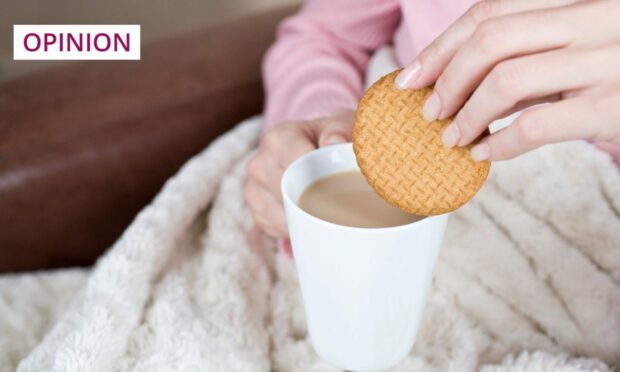Shall I have a wee whinge about prices this week? Yeah, why not?
People I speak to like to know that it is not just them who are feeling the pinch. They do not want to constantly moan themselves, but they love it when the paper person assumes that responsibility. And they do not understand why the price of crude oil is coming down, but filling stations are still charging us an almighty whack every time we fill up.
Some retailers keep prices down, not by buying more in bulk like they keep telling us, but by flogging us smaller versions of products – at the same price. You can hardly buy a biscuit or a chocolate bar that hasn’t mysteriously shrunk from what it was 20 years ago or 10 or last year.
This year already, standard packs of McVitie’s Digestives are being cut from 400g to 360g. Multipacks of Penguin and Club biscuits are reducing from eight bars to seven. A sneaky trick used by many outlets, it has a name – shrinkflation.
The other really sneaky way they do it is by just cutting down on the quality of things we all need. The latest sneakily-shrinkflated necessity is toilet tissue. The budget end of the line has become very thin, and some are not fit for purpose.
You don’t know what I mean? Let me put it this way: I once thought I would discover my inner self through Eastern philosophy, not through flimsy, single-ply toilet paper.

Not-fit-for-purpose ferry company CalMac was on the telly at the weekend. That was not just because the Eriskay to Barra ferry is the latest to go kaput. This was the first episode in an eight-part fly-on-the-wall documentary about the company and its people and its passengers, lamely entitled Island Crossings. Sure enough, it was the actual staff and passengers, or frustrated intending passengers, that were doing the talking, so that augurs well for the rest of the series.
The programme covered the staff at work, but also when they were on a break. The highlight was some of the male staff, round the back of the Oban office, trying to raise money for charity by scoffing herring.
I love fresh herring – though it has been sold out at Ronnie Scott’s emporium of fishy delights before I’ve been able to get to it every week this season so far – but these Obanaich were trying to scoff surströmming, which is Swedish for sour herring. It is not just sour but actually fermented in a barrel for six weeks, and is one of the most putrid smells of any snack worldwide – even the much maligned guga, the famed Hebridean stinky bird delicacy, beloved of people who have no taste.
None of these doughty Argyllshire lads could put even a tiny, stinky morsel in their gobs without retching loudly and puking disgustingly. It was fun to watch. I suppose it was like I’m a Celebrity… Get Me Out of Here, Oban style.
Not that kind of hook-up
We had a much better scoff last week in Ness. Treating herself to a belated anniversary of us hooking up together, we ended up in the Cross Inn. It was great.
Mrs X had me scratching my head when she threw caution to the wind and plumped for chicken with haggis. Haggis? Mrs X? And my sea bass was out of this world – well, out of the sea at any rate, and not so long ago either. The best.
As we drove back, we noticed a sign at Shader. It said: “Overnight Parking with EHU”. I explained that it was for caravans and campervans, and EHU means electric hook-up.
Mrs X was appalled. She said: “So, it’s a place for people in campervans to get together for jiggery-pokery. Under our noses. That’s shocking.”
It took me all the way to Barvas to explain that it’s not that kind of hook-up, but just power points to get electricity to their cookers, TVs and, from now on, electric blankets. That technology must be really handy for tourists.
Tech is getting too high-tech
Finally, I must whinge about the technology in our pockets right now. We use debit and credit cards for a lot of things, but this is where we have to watch out for prices, too. They can catch you out if you’re not careful.
The downside is that all but the youngest of us can lose track a bit about what card does what
The cards that we use are fast becoming multipurpose. Did you know that you now can have embedded images and circuits, barcodes and QR codes on all kinds of cards? They are so high-tech now.
The downside is that all but the youngest of us can lose track a bit about what card does what. Last week, I accidentally paid for my takeaway with my library card. My pizza is due back next Thursday.
Iain Maciver is a former broadcaster and news reporter from the Outer Hebrides

